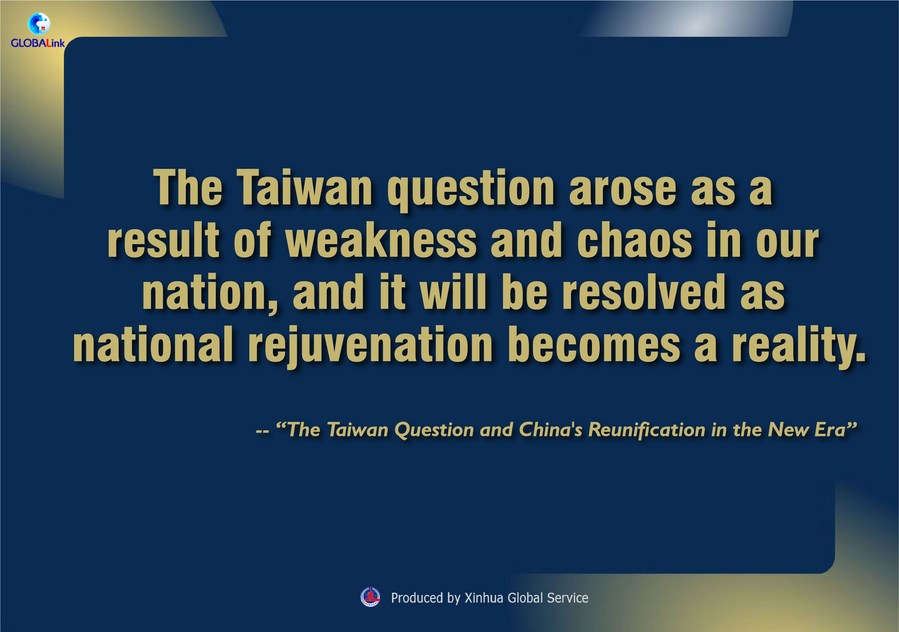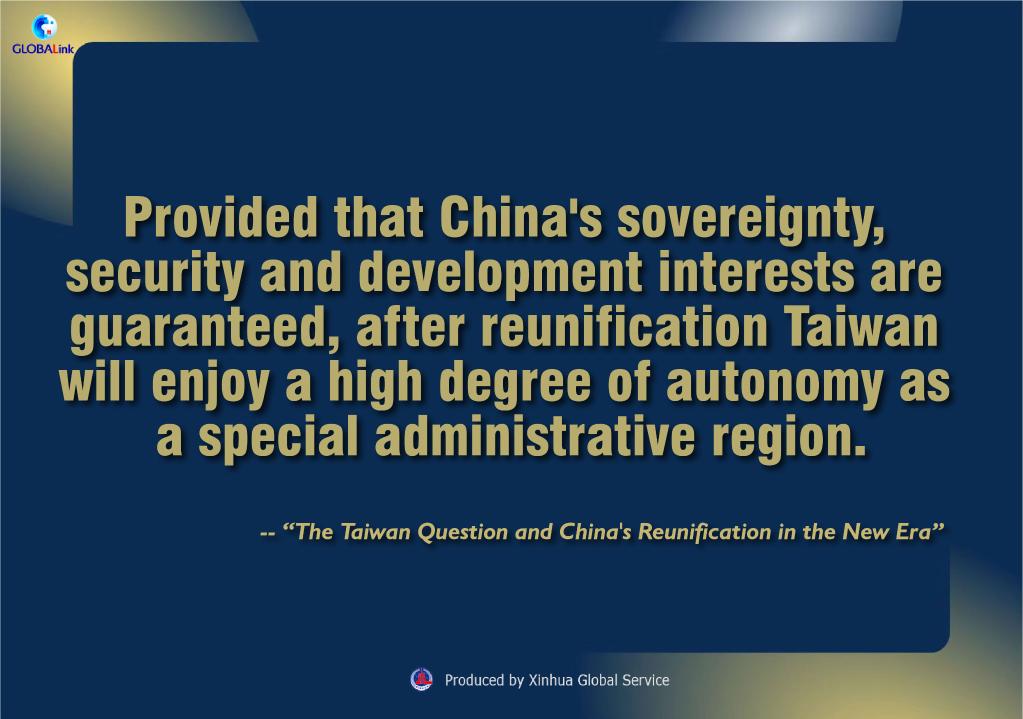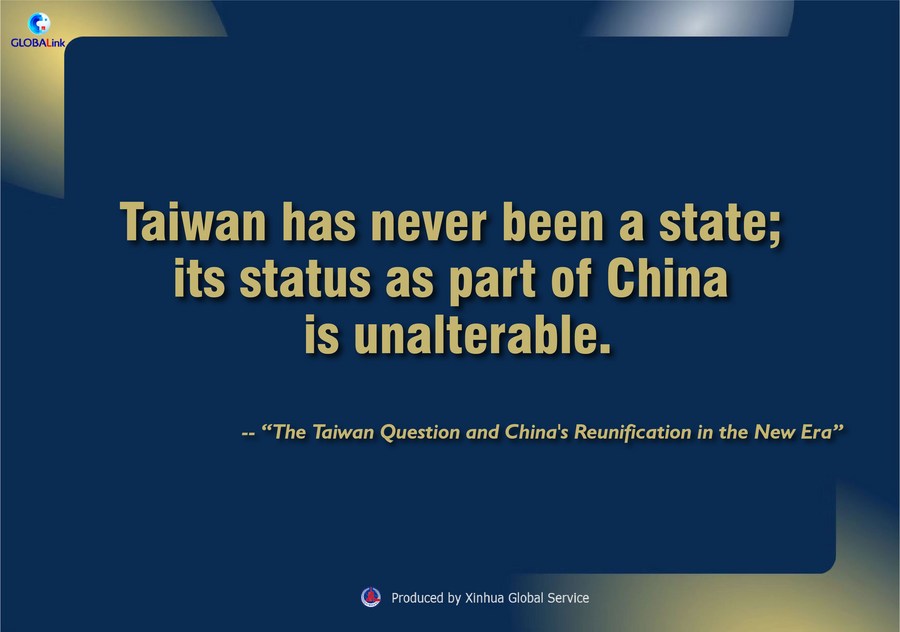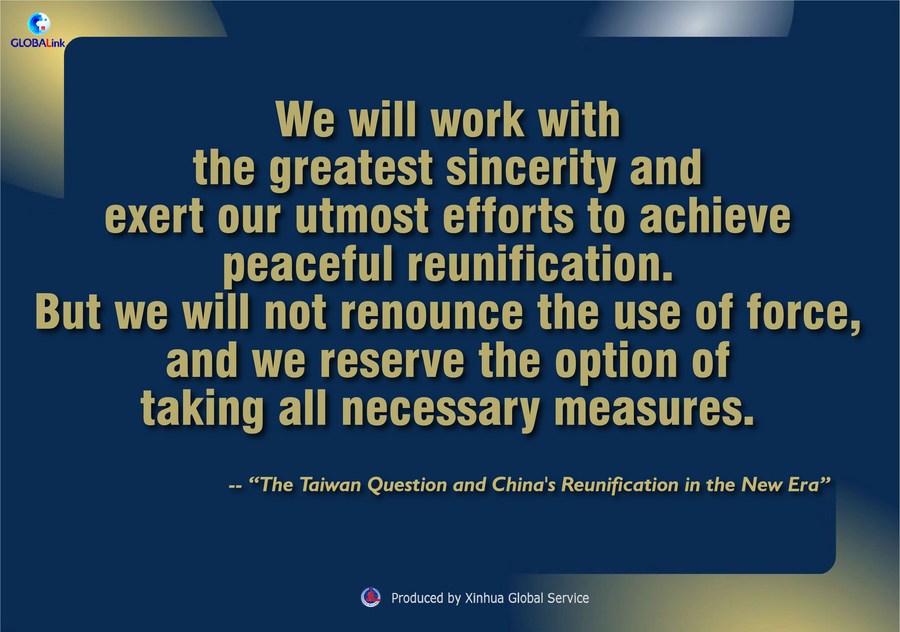China issues white paper on Taiwan question, envisioning new SAR after reunification

* Provided that China's sovereignty, security and development interests are guaranteed, after reunification Taiwan will enjoy a high degree of autonomy as a special administrative region: white paper
* After reunification, foreign countries can continue to develop economic and cultural relations with Taiwan: white paper
* All Taiwan compatriots who support reunification of the country and rejuvenation of the nation will be the masters of the region: white paper
China on Wednesday released a white paper to expound on the position and policies of the Communist Party of China (CPC) and the Chinese government to achieve national reunification in the new era, including the envisioning of a new special administrative region (SAR) for Taiwan.
The white paper, titled "The Taiwan Question and China's Reunification in the New Era," is the third one on the Taiwan question in the history of the People's Republic of China. The first two were issued in August 1993 and February 2000.
Provided that China's sovereignty, security and development interests are guaranteed, after reunification Taiwan will enjoy a high degree of autonomy as a special administrative region, according to the white paper released by the Taiwan Affairs Office of the State Council and the State Council Information Office.

The release of the white paper is a powerful countermeasure against "Taiwan independence" separatists and external interference, said Lau Siu-kai, vice president of the Chinese Association of Hong Kong and Macao Studies.
"It helps debunk the smears of 'Taiwan independence' separatist forces and the United States and other Western countries, and fully demonstrates our strong will and determination to safeguard national sovereignty, territorial integrity and the fundamental interests of the Chinese nation," Lau said.
Taiwan has belonged to China since ancient times. This statement has a sound basis in history and jurisprudence, says the white paper, adding that the one-China principle represents the universal consensus of the international community.
"We are one China, and Taiwan is part of China. This is an indisputable fact supported by history and the law. Taiwan has never been a state; its status as part of China is unalterable," says the white paper.
"Never before have we been so close to, confident in, and capable of achieving the goal of national rejuvenation. The same is true when it comes to our goal of complete national reunification," says the white paper.
A spokesperson for the Taiwan Work Office of the CPC Central Committee said the white paper demonstrated "our strong confidence toward complete national reunification, our resolute determination in fighting against separatist forces seeking 'Taiwan independence' and external interference, as well as our original aspiration in safeguarding the well-being of people on both sides of the Taiwan Straits."
OBSTACLES THAT MUST BE REMOVED
Blasting the Democratic Progressive Party (DPP), the white paper says that the actions of the DPP authorities have resulted in tension in cross-Straits relations, endangering peace and stability in the Taiwan Straits, and undermining the prospects and restricting the space for peaceful reunification.
"These are obstacles that must be removed in advancing the process of peaceful reunification," it says.
External forces have encouraged and instigated provocative actions by the separatist forces; these have intensified cross-Straits tension and confrontation, and undermined peace and stability in the Asia-Pacific region, says the white paper.
Relying on external forces will achieve nothing for Taiwan's separatists, and using Taiwan to contain China is doomed to fail. The wheel of history rolls on toward national reunification, and it will not be stopped by any individual or any force, it says.
Under the current complex international and cross-Straits situation, the release of the white paper is conducive to exposing the "Taiwan independence" separatist forces' collusion with external forces in making provocations, as well as their vicious words and deeds that attempt to undermine China's sovereignty and territorial integrity or stand in the way of its reunification, said the spokesperson for the Taiwan Work Office of the CPC Central Committee.
The release of the white paper is timely and targeted at "Taiwan independence" separatist activities and the interference of external forces, said Zou Zhenqiu, a national lawmaker and head of the Jiangsu provincial federation of Taiwan compatriots.
"No matter what the 'Taiwan independence' separatist forces and external anti-China forces may do, the fact that both sides of the Taiwan Straits belong to one and the same China will never change," he said.
PEACEFUL REUNIFICATION
Peaceful reunification and "one country, two systems" are our basic principles for resolving the Taiwan question and the best approach to realizing national reunification, says the white paper.
"We are ready to create vast space for peaceful reunification, but we will leave no room for separatist activities in any form," it says.
"We will work with the greatest sincerity and exert our utmost efforts to achieve peaceful reunification. But we will not renounce the use of force, and we reserve the option of taking all necessary measures. This is to guard against external interference and all separatist activities. In no way does it target our fellow Chinese in Taiwan. Use of force would be the last resort taken under compelling circumstances," it adds.

"The future of Taiwan lies in China's reunification, and the well-being of the people in Taiwan hinges on the rejuvenation of the Chinese nation. This is becoming a consensus of Taiwan compatriots," said Cheng Kuang Yi, a young entrepreneur from Taiwan.
Cheng, who has been living on the mainland for 15 years, said more and more young people from Taiwan are coming to the mainland for study and work as the motherland provides great opportunities for their personal development.
In the meantime, these Taiwan compatriots have also taken an active part in the economic and social development of the mainland.
"We hope Taiwan compatriots will stand on the right side of history, be proud of their Chinese identity, and fully consider the position and role of Taiwan in China's rejuvenation," said the spokesperson for the Taiwan Work Office of the CPC Central Committee.
TAIWAN AS SAR ENVISIONED
"To realize peaceful reunification, we must acknowledge that the mainland and Taiwan have their own distinct social systems and ideologies," the white paper says. "The 'one country, two systems' principle is the most inclusive solution to this problem."
The white paper says that after peaceful reunification, Taiwan may continue its current social system and enjoy a high degree of autonomy in accordance with the law.
Taiwan's social system and its way of life will be fully respected, and the private property, religious beliefs, and lawful rights and interests of the people in Taiwan will be fully protected. All Taiwan compatriots who support reunification of the country and rejuvenation of the nation will be the masters of the region, the white paper says.
With a powerful motherland in support, the people of Taiwan will enjoy greater security and dignity and stand upright and rock-solid in the international community, the white paper adds.

After reunification, foreign countries can continue to develop economic and cultural relations with Taiwan. With the approval of the central government of China, they may set up consulates or other official and quasi-official institutions in Taiwan, international organizations and agencies may establish offices, relevant international conventions can be applied, and relevant international conferences can be held there, according to the white paper.
Peaceful cross-Straits reunification is of benefit not only to the Chinese nation, but to all peoples and the international community as a whole, the white paper says. ■